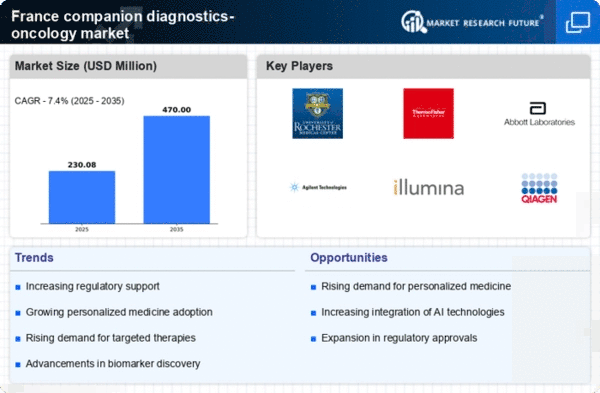Rising Incidence of Cancer
The increasing incidence of cancer in France is a primary driver for the companion diagnostics-oncology market. According to recent statistics, cancer cases are projected to rise by approximately 2.5% annually, leading to a heightened demand for personalized treatment options. This trend necessitates the development of companion diagnostics that can identify specific biomarkers associated with various cancers. As healthcare providers seek to enhance treatment efficacy, the integration of companion diagnostics becomes essential. The companion diagnostics-oncology market is thus positioned to grow, as these tools enable tailored therapies that improve patient outcomes and reduce adverse effects. Furthermore, the French healthcare system is increasingly prioritizing precision medicine, which further supports the adoption of companion diagnostics in oncology. This shift is likely to create a robust market environment for innovative diagnostic solutions.
Government Initiatives and Funding
Government initiatives and funding aimed at enhancing cancer care in France are pivotal for the companion diagnostics-oncology market. The French government has allocated substantial resources to support research and development in oncology, with a focus on personalized medicine. This includes funding for projects that aim to develop innovative companion diagnostics that can improve treatment precision. The companion diagnostics-oncology market is expected to benefit from these initiatives, as they foster collaboration between public institutions and private companies. Additionally, the establishment of regulatory frameworks that encourage innovation is likely to accelerate the approval process for new diagnostic tools. As a result, the market may experience a surge in new product launches, further driving growth and enhancing the overall landscape of cancer treatment in France.
Advancements in Genomic Technologies
Technological advancements in genomic sequencing and analysis are significantly influencing the companion diagnostics-oncology market. Innovations such as next-generation sequencing (NGS) have made it possible to identify genetic mutations and alterations with unprecedented accuracy and speed. In France, the adoption of these technologies is expected to enhance the development of companion diagnostics that can guide targeted therapies. The market is projected to witness a growth rate of around 15% annually, driven by the increasing availability of genomic data and the need for personalized treatment strategies. As healthcare providers leverage these advancements, the companion diagnostics-oncology market is likely to expand, offering new opportunities for both established and emerging players. The integration of genomic technologies into clinical practice is anticipated to streamline the diagnostic process, ultimately leading to improved patient care and outcomes.
Increasing Patient Awareness and Demand
The growing awareness among patients regarding personalized medicine is a significant driver for the companion diagnostics-oncology market. In France, patients are becoming more informed about their treatment options and the role of diagnostics in guiding therapy decisions. This shift in patient behavior is leading to increased demand for companion diagnostics that can provide insights into the most effective treatment pathways. As patients advocate for personalized care, healthcare providers are compelled to incorporate these diagnostic tools into their practice. The companion diagnostics-oncology market is likely to see a corresponding increase in adoption rates, as patients seek treatments that are tailored to their specific genetic profiles. This trend not only enhances patient engagement but also drives the overall growth of the market, as more individuals seek out advanced diagnostic solutions.
Collaboration Between Industry and Academia
Collaboration between industry and academic institutions is emerging as a crucial driver for the companion diagnostics-oncology market. In France, partnerships are being formed to facilitate research and development of innovative diagnostic solutions. These collaborations often lead to the sharing of knowledge, resources, and expertise, which can accelerate the development of new companion diagnostics. The market is expected to benefit from these synergies, as academic research often provides the foundational science that informs product development. Furthermore, such partnerships can enhance the validation processes for new diagnostics, ensuring they meet regulatory standards. As a result, the companion diagnostics-oncology market may experience increased innovation and a faster time-to-market for new products, ultimately improving patient care and treatment outcomes.
















